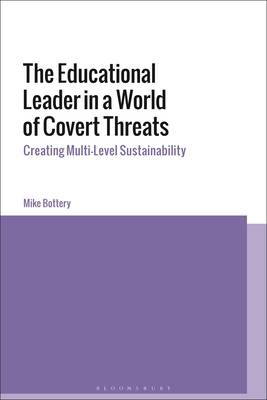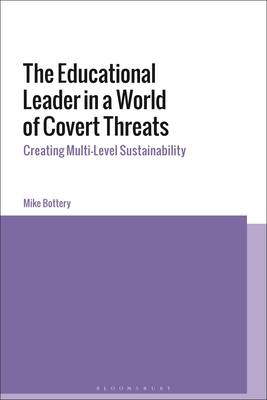
- Afhalen na 1 uur in een winkel met voorraad
- Gratis thuislevering in België vanaf € 30
- Ruim aanbod met 7 miljoen producten
- Afhalen na 1 uur in een winkel met voorraad
- Gratis thuislevering in België vanaf € 30
- Ruim aanbod met 7 miljoen producten
The Educational Leader in a World of Covert Threats
Creating Multi-Level Sustainability
Mike Bottery
Hardcover | Engels
€ 220,45
+ 440 punten
Uitvoering
Omschrijving
In a rapidly changing world with threats to the sustainability of the environment, societies, institutions and the people within them, a crucial question for educational leaders needs to be: what are these threats to sustainability, and how does the role of the educational leader need adapting to meet them through this century?
Mike Bottery unpacks this question by examining how major terms in the field are used, mis-used, or mis-understood, before looking specifically at five covert threats: wicked problems, positive feedback, exponential growth, inappropriate degrees of connectivity, and tipping points. He looks at the impact these threats have upon sustainability at micro-, meso-, and macro- levels, and how understanding and meeting these threats needs to change the educational leader's thought, values, and practice. Bottery argues that such awareness should not only change the focus of educational institutions, but also the focus of those inspecting such institutions. Such recognition then needs to become part of the cultural zeitgeist of present-day societies if future generations are to inherit a sustainable world. In so doing, The Educational Leader in a World of Covert Threats provides an original, timely and essential re-think of the educational leader's role which makes it unique in the educational leadership literature.
Mike Bottery unpacks this question by examining how major terms in the field are used, mis-used, or mis-understood, before looking specifically at five covert threats: wicked problems, positive feedback, exponential growth, inappropriate degrees of connectivity, and tipping points. He looks at the impact these threats have upon sustainability at micro-, meso-, and macro- levels, and how understanding and meeting these threats needs to change the educational leader's thought, values, and practice. Bottery argues that such awareness should not only change the focus of educational institutions, but also the focus of those inspecting such institutions. Such recognition then needs to become part of the cultural zeitgeist of present-day societies if future generations are to inherit a sustainable world. In so doing, The Educational Leader in a World of Covert Threats provides an original, timely and essential re-think of the educational leader's role which makes it unique in the educational leadership literature.
Specificaties
Betrokkenen
- Auteur(s):
- Uitgeverij:
Inhoud
- Aantal bladzijden:
- 272
- Taal:
- Engels
Eigenschappen
- Productcode (EAN):
- 9781350160521
- Verschijningsdatum:
- 16/06/2022
- Uitvoering:
- Hardcover
- Formaat:
- Genaaid
- Afmetingen:
- 156 mm x 234 mm
- Gewicht:
- 557 g

Alleen bij Standaard Boekhandel
+ 440 punten op je klantenkaart van Standaard Boekhandel
Beoordelingen
We publiceren alleen reviews die voldoen aan de voorwaarden voor reviews. Bekijk onze voorwaarden voor reviews.










